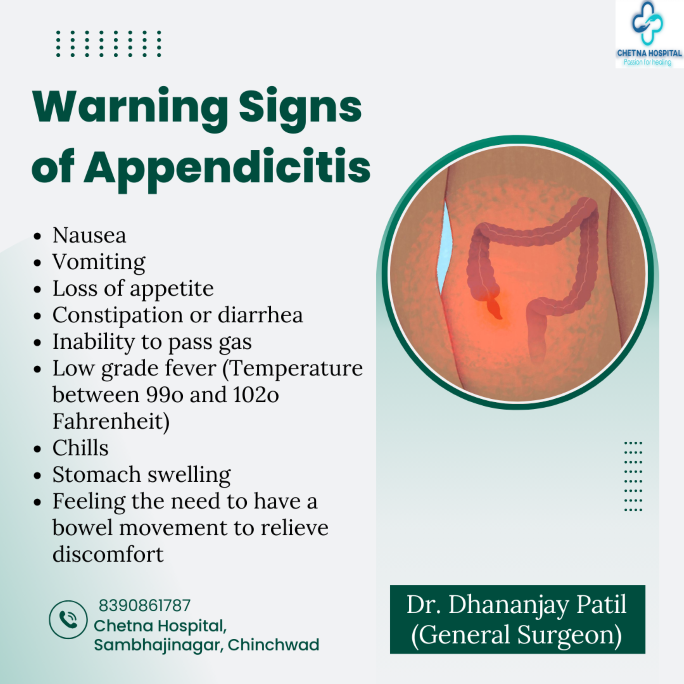Appendicitis is one of the most common causes of emergency abdominal surgery. It occurs when the appendix, a small tube-like organ attached to the large intestine, becomes inflamed. Though the exact purpose of the appendix remains unclear, its inflammation can lead to severe complications if left untreated. This small organ can cause significant problems, making it essential to recognize the early warning signs of appendicitis and seek timely medical intervention.
In this article, we’ll explore what appendicitis is, its causes, symptoms to watch out for, and why immediate medical care is vital. At Chetna Hospital, we prioritize prompt diagnosis and treatment, ensuring patients avoid complications and have a smooth recovery process. If you suspect you may have appendicitis, don’t hesitate to contact us at chetnahospital.co.in for expert care.
What is Appendicitis?
Appendicitis is the inflammation of the appendix, often due to a blockage or infection. The blockage may result from stool, mucus, or other debris becoming trapped in the appendix. This blockage can lead to bacterial overgrowth, causing the appendix to swell, become inflamed, and eventually rupture if untreated.
A ruptured appendix is a medical emergency. Once it bursts, harmful bacteria spill into the abdominal cavity, causing peritonitis—an infection of the abdominal lining that can spread rapidly and become life-threatening.
Who is at Risk for Appendicitis?
Appendicitis can affect anyone, but it is most common in people between the ages of 10 and 30. There are no foolproof ways to predict who will develop appendicitis, though it is slightly more common in males than females. While lifestyle choices or diet may not directly lead to appendicitis, maintaining general digestive health may play a role in reducing risks.
The most important step in preventing severe outcomes is recognizing the signs early and seeking prompt treatment. At Chetna Hospital, our skilled surgeons are ready to provide expert care when needed. Visit chetnahospital.co.in to learn more or schedule an appointment.
Key Warning Signs of Appendicitis
Recognizing the symptoms of appendicitis early on can make all the difference in preventing serious complications. Symptoms can vary from person to person, but the most common signs include:
1. Abdominal Pain
Abdominal pain is the hallmark symptom of appendicitis. It usually starts as a dull ache near the navel and then gradually shifts to the lower right side of the abdomen. The pain tends to worsen with time and can become sharp and severe within hours. Movements such as coughing, walking, or pressing on the area may exacerbate the pain.
Key characteristics of appendicitis pain:
- Begins around the belly button and moves to the lower right abdomen.
- Sharp, persistent pain that intensifies with time.
- Worsens with movement, deep breaths, or pressure.
2. Nausea and Vomiting
Nausea and vomiting often accompany the onset of appendicitis. As the appendix becomes inflamed, it can disrupt the digestive system, causing feelings of queasiness. Vomiting may follow as the body attempts to expel toxins or cope with the inflammation.
3. Loss of Appetite
A sudden loss of appetite is common in people with appendicitis. Digestive discomfort, combined with the inflammation, may lead to a reluctance to eat or drink. This symptom is usually an early warning sign, developing shortly after abdominal pain begins.
4. Low-Grade Fever
Appendicitis may trigger a mild fever, typically ranging between 99°F and 100.5°F (37.2°C to 38°C). A higher fever may develop if the appendix ruptures, signaling a more serious infection. If fever is accompanied by chills, it’s essential to seek immediate medical attention, as this could indicate the onset of peritonitis.
5. Bloating and Gas
Bloating is another common symptom of appendicitis. The abdomen may feel swollen or tight, and some patients report an inability to pass gas or experience constipation. This can be a sign that the inflammation is affecting the normal functioning of the intestines.
6. Changes in Bowel Movements
While constipation is common, some patients may experience diarrhea instead. Any significant changes in bowel movements, when combined with abdominal pain, nausea, and fever, should be taken seriously as potential indicators of appendicitis.
7. Rebound Tenderness
Rebound tenderness occurs when pressure applied to the abdomen is suddenly released, and the pain worsens. This is a clinical sign of irritation to the peritoneum, the lining of the abdominal cavity, and is often seen in cases of appendicitis. If you experience rebound tenderness, it’s a strong indication that you need immediate medical evaluation.
Why Timely Treatment is Critical
Appendicitis is a time-sensitive condition. If left untreated, the appendix may rupture within 48 to 72 hours of symptom onset. When the appendix bursts, bacteria spill into the abdomen, causing severe infections that can spread throughout the body.
A ruptured appendix requires emergency surgery and more intensive care, as it often leads to complications like abscesses or widespread infection (sepsis). The sooner appendicitis is diagnosed, the better the outcome. A straightforward appendectomy, which involves removing the inflamed appendix, is much easier to recover from than surgery performed after a rupture.
Chetna Hospital offers both open surgery and laparoscopic (minimally invasive) surgery for appendicitis. Laparoscopic surgery is the preferred method when possible, as it involves smaller incisions, less postoperative pain, and quicker recovery times. To learn more about our surgical services, visit chetnahospital.co.in.
Diagnosis and Treatment of Appendicitis
When you arrive at a hospital with suspected appendicitis, doctors will perform several tests to confirm the diagnosis. These may include:
- Physical Exam: Pressing on the abdomen to check for tenderness and rebound pain.
- Blood Tests: To detect signs of infection, such as elevated white blood cell count.
- Imaging: Ultrasounds, CT scans, or MRI scans may be used to visualize the appendix and confirm inflammation.
Once appendicitis is diagnosed, the treatment is almost always surgical removal of the appendix, known as an appendectomy. There are two main types of appendectomy:
- Open Appendectomy: Involves a single large incision in the lower right abdomen to remove the appendix.
- Laparoscopic Appendectomy: Involves several small incisions and the use of a camera to guide the removal of the appendix. This method is less invasive and generally has a quicker recovery time.
Both types of surgery are highly effective, but laparoscopic surgery tends to offer faster healing and fewer complications. At Chetna Hospital, our experienced surgeons specialize in performing these procedures with precision and care. You can learn more about our services by visiting chetnahospital.co.in.
Recovery After Appendectomy
After an appendectomy, recovery time varies depending on whether the surgery was open or laparoscopic and whether the appendix ruptured. Patients who undergo laparoscopic surgery can usually return to normal activities within 1–3 weeks, while those who had open surgery or complications from a ruptured appendix may take 4–6 weeks to fully recover.
Key tips for recovery:
- Rest and avoid strenuous activities for a few weeks.
- Follow your doctor’s advice on pain management.
- Stay hydrated and eat a light diet at first, gradually reintroducing solid foods.
- Keep the surgical incisions clean and dry to avoid infection.
- Attend follow-up appointments to ensure healing is progressing as expected.
Conclusion: Don’t Ignore the Warning Signs of Appendicitis
Appendicitis can be a dangerous condition if not treated promptly. Recognizing the symptoms early and seeking immediate medical attention is crucial in preventing complications such as a ruptured appendix or severe infection. If you experience any of the warning signs of appendicitis, do not wait—reach out for medical assistance right away.
At Chetna Hospital, we are committed to providing expert diagnosis and treatment for appendicitis and other medical emergencies. Our dedicated team of healthcare professionals is here to ensure your safety and well-being. Visit chetnahospital.co.in to learn more or schedule an appointment with our specialists.
For Consultation Contact us on 8390861787
Website – www.chetnahospital.co.in
Address – Chetna Hospital, Sambhajinagar, MIDC, G Block, Near Rotary Club, Chinchwad 411019
#pune#pcmc#chinchwad#hospital#appendix#appendicitis#appendicitissymptoms#appendixpain#surgery#appendectomy#signsofappendicitis#acuteappendicitis#appendicitiscauses#appendixsurgery#appendicitistreatment#appendicitissurgery#appendicitispain#repturedappendix#appendixremoval#abdominalpain#surgicaldisease#acuteappendicitis#generalsurgeon
See less













